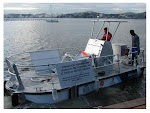A crise econômica internacional não afetou empregos e salários relacionados ao Mercado de Carbono. A pesquisa Carbon Salary Survey 2010, realizada pelas empresas Acre Resources e Acona, apresentaram alguns resultados interessantes, como:
- Os problemas políticos que o governo Obama está enfrentando, com a resistência dos parlamentares republicanos que estão barrando todas as iniciativas de estabelecer uma política de Carbono nos EUA, está afetando o mercado no país. Um dos sinais que as coisas não estão bem é que houve uma queda de 7% no número de americanos interessados em responder à pesquisa.
- Austrália e Nova Zelândia foram os países onde os resultados do mercado foram mais consistentes.
- As áreas de atuação profissional do setor de Carbono que mais cresceram foram: energia solar (principalmente na Gra Bretanha), gestão de resíduos e políticas/legislação/controle (principalmente nos EUA, Austrália/Asia e África).
- O salário médio anual declarado por profissionais do setor foi de US$ 79.000, US$ 2.000 acima da média de 2009.
- Salários anuais médios por região: Austrália/Asia registrou a maior média: US$ 115,000, América do Norte US$ 104,000, Reino Unido US$ 81,000, Europa US$ 81,000, Oriente Médio US$ 74,500, América Latina US$ 66,500, Ásia Oriental US$ 60,500, África US$ 57,000 e outras partes da Ásia em torno de US$ 40,000.
-------
Carbon jobs market resilient to recession
Employment and incomes in the climate change and carbon sector appear to be holding up well in the face of ongoing economic hardship, the results of a worldwide survey shows. Average salaries rose and respondents overall reported greater levels of job security and satisfaction compared to 2009, the Carbon Salary Survey 2010 found. The only worldwide job market appraisal in this field surveyed 944 participants in the climate change, carbon markets, renewable energy and clean technology fields in all regions. It was conducted in September and October by recruitment firm Acre Resources and corporate sustainability consultancy Acona.
It would appear that the global recession has had relatively little impact on employment conditions within the carbon sector, said Paul Burke, senior partner at Acona. “This suggests to me that interest in the area – from public, private and third sectors – remains strong.” One of the most concerning signs emerged in North America where the number of survey participants dropped by 7 per cent, said Andy Cartland, managing director of Acre Resources. This is perhaps not surprising result given the lack of success the Obama administration faced in legislating a cap and trade scheme and other climate regulatory measures over the course of the year.
Especially healthy results emerged from Australasia, a smaller region consisting mainly of Australia and New Zealand. The region boasted the highest average salary, the most satisfied professionals and among the highest levels of job security. These results probably owe much to the region’s escape from the worst of the global financial crisis, with Australia managing to avoid recession altogether. Its job market remained relatively resilient while the advent of the emissions trading scheme mid-year in New Zealand added impetus the carbon sector there.
Energy efficiency and consulting and project development in the CDM and JI offsets schemes continue to be the most common activity in which those in the carbon sector are specifically involved. Solar energy (particularly in the UK), waste management and the law/policy/regulation field (particularly in North America, Australasia and Africa) all accounted for an increasing share in 2010.
The average salary reported across the carbon sector last year was $US79,000, $2000 higher than 2009. While a positive sign in poor economic times in most of the world, the rise may owe more to the survey reaching a higher proportion of senior professionals this time round. A key development over the past year has been the proliferation of the position of Chief Sustainability Officer, Cartland said. This is “a senior and strategic role focused on maximising the commercial opportunities arising from sustainability”.
Contractors or consultants accounted for 15 per cent of respondents and earned 18 per cent more than the 85 per cent that are in full-time or in-house employment. Australasia recorded the highest average salary at $US115,000, North America $104,000, UK$81,000, Europe $81,000, Middle East $74,500, Latin America $66,500, East Asia $60,500, Africa $57,000 and other Asian regions around $40,000. The highest salaries ($105,000 and up) by industry were found where traditional professions and services were applied to the carbon sector; banking, finance, insurance, legal and marketing/PR. Higher salaries over this level were also paid in established industries now with a carbon management imperative; oil & gas, power utilities and telecommunications. Similar results emerged in salary by job function and the survey breaks down the average salaries by job function and region in a handy comparative table.
The proportion of female participants in this year’s survey increased from 24 per cent to 31 per cent, but a gender pay gap widened in 2010 from an average $15,000 to $20,000. Nearly half of all respondents, and all of the contractors, reported receiving no annual bonus. ”For many professionals working in climate change and carbon, bonuses are not part of their remuneration packages,” the survey concludes. From those who did receive bonuses, it appears that, while carbon salaries are on the rise, bonuses are falling - sharply in some regions.
Evy Tykgaard, a talent acquisition specialist at Vestas Wind Systems says the survey shows a thriving but still immature industry with disparity of salary and bonuses. “I believe this may change in the future as sustainability and environmental strategies begin to feed into mainstream company procedures,” Tykgaard said. Those working in the carbon field tend to be highly qualified with more than a third having a postgraduate degree and almost 60 per cent having at least an undergraduate qualification. And in perhaps a further sign of the immaturity of the sector, professionals with specific climate change/carbon qualifications are still earning less than those in the sector with non-related, more traditional qualifications.
Overall, 73 per cent of the respondents said they were satisfied in their jobs. Regionally the most satisfied professionals were found in Australasia. The Middle East/Western Asia has the lowest levels of job satisfaction. Satisfaction levels rose in North America and the UK by 3 per cent and remained the same in the Rest of Europe. On the question of job security, Latin America and Australasia recorded the highest proportion reporting improved conditions. The charity/NGO, consultancy/advisor and government fields showed the highest percentages of professionals feeling less secure in their jobs than 12 months ago, almost certainly a function of the budget cuts announced by many governments over the course of the year.
Fonte: CarbonPositive























Nenhum comentário:
Postar um comentário
Contribua. Deixe aqui a sua crítica, comentário ou complementação ao conteúdo da mensagem postada no Blog do Axel Grael. Obrigado.